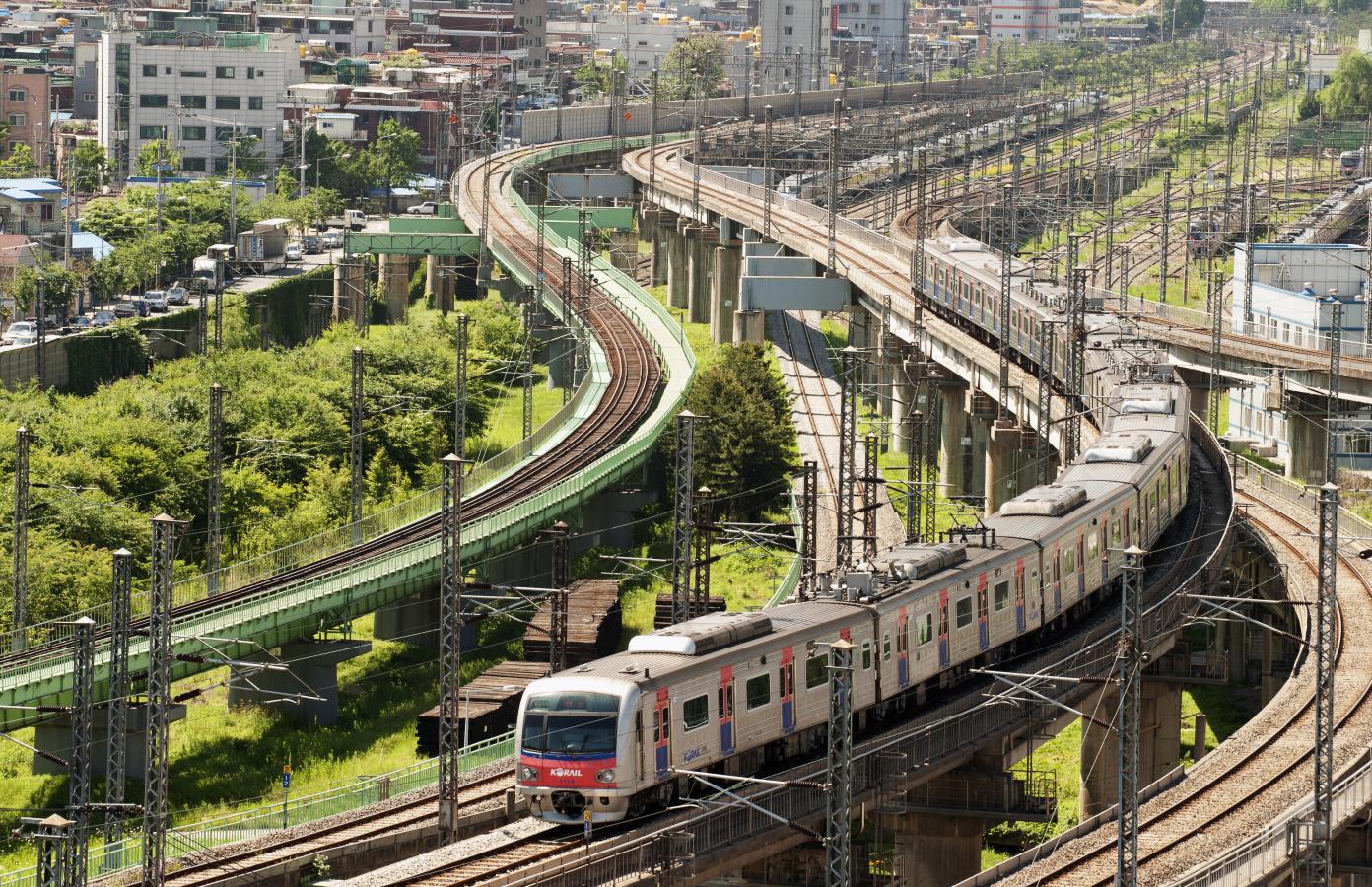Statement delivered by Haoliang Xu as the Co-Chair, at the Second United Nations Global Sustainable Transport Conference , Thematic session 1: Sustainable transport, poverty eradication, livelihoods and economic recovery,Beijing, China.
Sustainable transport, poverty eradication, livelihoods and economic recovery
October 15, 2021

Transport in Asia. A train snakes its way through Seoul.
Your Excellency, Mr. Ma Junsheng, Director General of the State Post Bureau of China,
Colleagues, Ladies and Gentlemen
It is with great pleasure that I join you today at the Second United Nations Global Sustainable Transport Conference. I am honored to represent the United Nations Development Programme (UNDP) as co-chair with our host country of this first thematic session.
This is a crucial conference, addressing an issue made even more relevant by the the Covid-19 pandemic. The UN Secretary General called this Conference one of the key moments this year “for making peace with nature”, which he says is our defining task in the 21st century.
The urgency is clear --- we face an intensifying climate emergency. Reducing greenhouse gas (GHG) emissions is critical to keeping global warming below a catastrophic level, and sustainable transport is central to the radical change necessary to avert irreversible damage and disaster.
Transport accounts for 16% of GHG emissions, making it the third-largest contributor after energy (37%) and buildings (17%), due largely to the dominance of fossil fuels as the sector’s energy source.
A shift to sustainable practices is imperative --- sustainable transport, as defined in the concept note, is critically important if we want to recover from the coronavirus pandemic and stand a chance to achieve a sustainable, inclusive and resilient future as envisioned in the 2030 Agenda.
Why? Because sustainable transport, poverty eradication, livelihoods and economic recovery from the pandemic are inextricably connected.
This will require us to address some key issues and the fragilities exposed and deepened by the pandemic. Many studies, including UNDP’s own, have indicated that the pandemic is forcing more than 100 million people back into poverty.
The disruptions to the interlocking transport systems that move people and goods within and across countries, for example, seriously affected lives and livelihoods, hitting the most vulnerable disproportionately. The impact on travel and tourism, for instance, which comprises much of the service economy of many countries and on which many informal livelihoods rely, resulted in a 50% plunge to its global GDP share in 2020, to 5.5%, which was 10.4% in 2019 and accounted for 10.6% of all jobs.
The transport sector alone accounts for more than 60 million jobs around the world, representing over 2% of global employment.
Disruptions to global supply chains that relied on predictable transport flow also meant deprivations everywhere, worsening conditions for those already in precarious situations. They hit not only the revenues of companies but also of governments. Particularly had hit are cities, which were the epicenters of the pandemic and in general the centers of economic activities, and the ports and hubs for freight and passenger transport.
To move forward, to achieve green recovery from the pandemic, and to advance inclusive prosperity for societies and communities within our planetary boundaries, our efforts therefore have to underline safe, affordable, accessible, efficient, resilient and low carbon pathways.
There are many ways to do so. Governments can link their climate pledges to the future development of a sustainable transport sector. In fact, through our Climate Promise initiative, we are supporting 120 countries to enhance their NDCs, of which over 1/3 have a specific focus on transport, addressing issues as such as sustainable transport planning, e-mobility, increasing the share of renewable energy in electric transport, development and deployment of clean fuel technologies, including fuel-cell, and scaling up non-motorized transportation modes.
We will need strong partnerships across the society, involving governments, public transport operators, energy utilities, private sector companies and citizens, if we want to promote and implement smart policies, new regulations and technology demonstrations, to enable the scaling up of sustainable transport solutions. UNDP is proud to be part of the Global Environment Facility’s Global E-mobility Programme that supports developing countries in this critical area.
We also need to harness the power of innovation and digital transformation to advance sustainable transport and accelerate progress towards 2030. But it is more than connectivity, electric cars, big data, AI, sensing and GPS. It’s also about people’s lives and livelihoods. Informal transport, for example, characterizes many rapidly growing metropolitan regions in developing countries. They provide affordable mobility as well as employment, and contribute to local economies and reduction of carbon footprint. How do we support workers in this sector, connect innovators to experiment and explore potential solutions and build collective intelligence by sharing what works, what doesn’t? Through our Accelerator Labs network, we are using innovation as an effective tool to bring focus to and drive changes in the informal transport sector.
Indeed, action at the local level is critical for achieving global goals and commitments, including those in the New Urban Agenda. With urban population projected to grow up to 70% by 2050, future transport demand is expected to rise, posing both challenges and opportunities for our sustainability goals.
The way we manage our cities today and their growth in the future can help shift us to low or zero-emission transport. Local governments and communities are now exploring walkability, active transport, and e-mobility among others to combat air pollution, enhance the liveability of their cities, and raise their quality of life. Our host country itself has some approaches that could be instructive to other countries and cities.
Our moderator Ani is a recognized world leader in this area and can speak a lot more eloquently on these important issues. I look forward to the discussions ahead in this session and throughout the Conference. UNDP looks forward to working closely with all stakeholders to advance sustainable transport for sustainable development.
Thank you.

 Locations
Locations